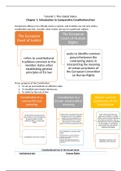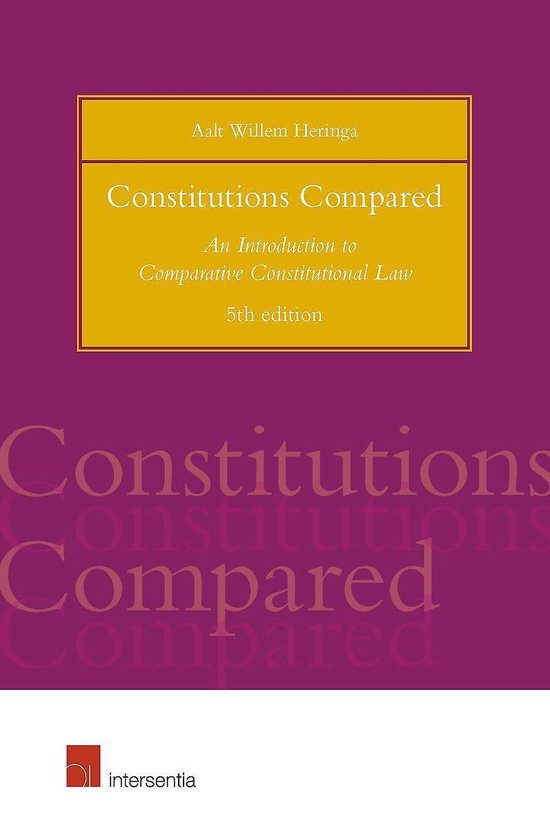Tutorial 1: The United States
Chapter 1: Introduction to Comparative Constitutional law
Comparison allows us to critically assess a system, and to better see not only what a
constitution says but, crucially, what it does not say on a particular subject.
The European
The European
Court of Human
Court of Justice
Rights
seeks to identify common
refers to constitutional ground between the
traditions common to the contracting states in
member states when interpreting the meaning
establishing general of certain provisions of
principles of EU law the European Convention
on Human Rights
Three purposes of the Constitution:
1. To set up and maintain an effective state
2. To establish and respect democracy
3. To abide by the rule of law
Constitution in a Constitution in a Deeper societal
narrow/formal broad/ substantitive significance of the
meaning meaning Constitution
entire body of fundamental rules mark a break with the past,
central written document that
that govern that socio-political settle past conflicts in writing,
sets out basic rules that apply to
entity: be they contained in a codify a social contract between
the government of socio-
central document or in many the citizens and their rulers so
political entities, in particular
documents, be they written that they may rule to the benefit
states
down or be they customary rules of the people, or strengthen
national identity and people’s
feeling of belonging
A constitution is a body of law
that:
attributes power to public authorities
constitution/ basic law/ charter regulates the fundamental relations
between authorities
regulates the fundamental relations Attribution of power and
between the public authorities and the
individual regulation of its exercise
Constitutional law in the broad sense
Institutional law Human Rights
,How the state and its Protection of the citizen against the state
institutions function Regulation of relations between public authority and the
The term and individual
the powers of
the
government
The
prerogatives of
a government
(powers
unique to the
sovereign)
How voters
elect their
representatives
The present volume is mainly devoted to the institutional aspect of constitutional law,
including institutional and procedural rules regarding human rights enforcement in courts
The four basic questions in Constitutional law
1. Since public law powers may only be exercised on the basis of an explicit
constitutional allocation: does institution X indeed have power Y?
1. Is the exercise of the power granted within the limits as defined by law?
2. Is the power and its exercise in conformity with other rules of the constitutional
systems such as human rights?
3. Who has the power (based also evidently upon a constitutional mandate) to
supervise the exercise of powers by others and in case of non-compliance of
nullifying the illegal exercise?
Alternative to written United Kingdom
Constitution No constitution in the narrow sense (no written
constitution)
Has a constitution in a broad sense like any other State
(A body of constitutional law)
Some of the parts of UK constitution are written
The devolution of certain legislative competences to Scotland,
which affects the distribution of power within the UK
Constitional law is laid down in a written statute adopted by the
UK Parliament
, Customs, conventions,
Judge-made case law Statutes gentlemen's
agreements
nowhere is it written that the
King appoints as his Prime
Minister the leader of the
concept of "sovereignty
laws made by Parliament political party that has, alone or
(supremacy) of Parliament"
in coalition with other parties, a
majority in the House of
Commons
election laws, the Parliaments'
Acts and others
Israel
Does not have a consolidated constitutional document
either
Sweden
Has a collection of fundamental statutes of constitutional
rank but no central charter
Unwritten rules Even States which do have a “written” constitution in the formal
sense can and do have unwritten rules that form part of their
broader constitution
Judges in the US have the right to declare legislation
unconstitutional
The US Constitution does not explicitly give judges this
right
This right was established by case law
Some pieces of legislation are considered broadly constitutional
rules even if they are not laid down in the central document
Law on election system
The statute of a constitutional court
The rules of procedure of parliament
Other parts of broader constitution
International law, international treaties- domestic
constitutional effect
Case law, customs, secondary legislation, learned writing,
natural law
Written Constitution vs Working Constitution
Working Constitution
The entirety of rules and perceptions regarding this
subject in society
Actors that take part in working constitution include not
only political institutions and courts but also media,
churches, trade unions, etc
An incumbent president mayhave the exact same legal powers
as his predecessor, but still be less powerful, because he lacks
political support, has a less persuasive authority, or operates
under complicated social conditions






